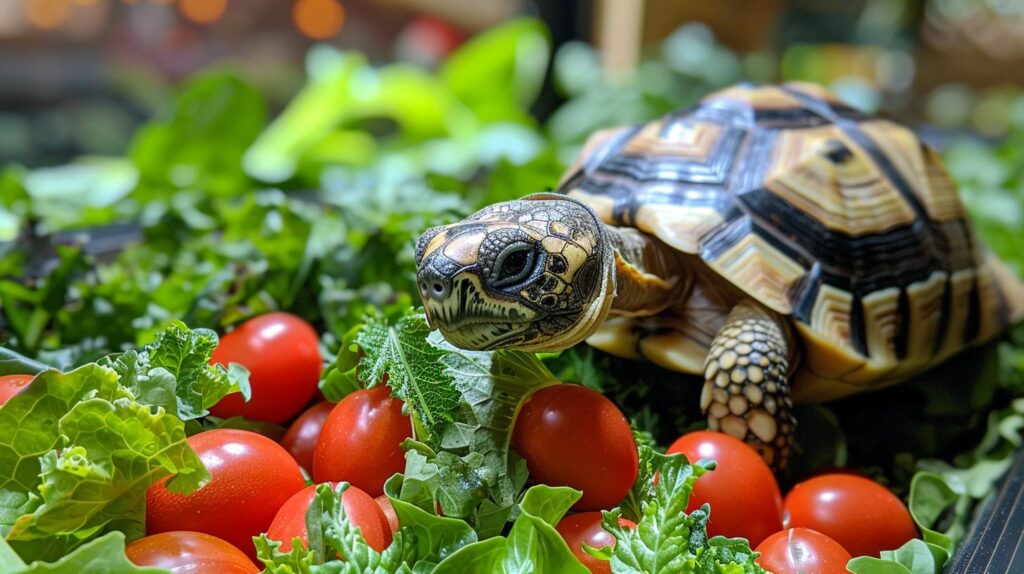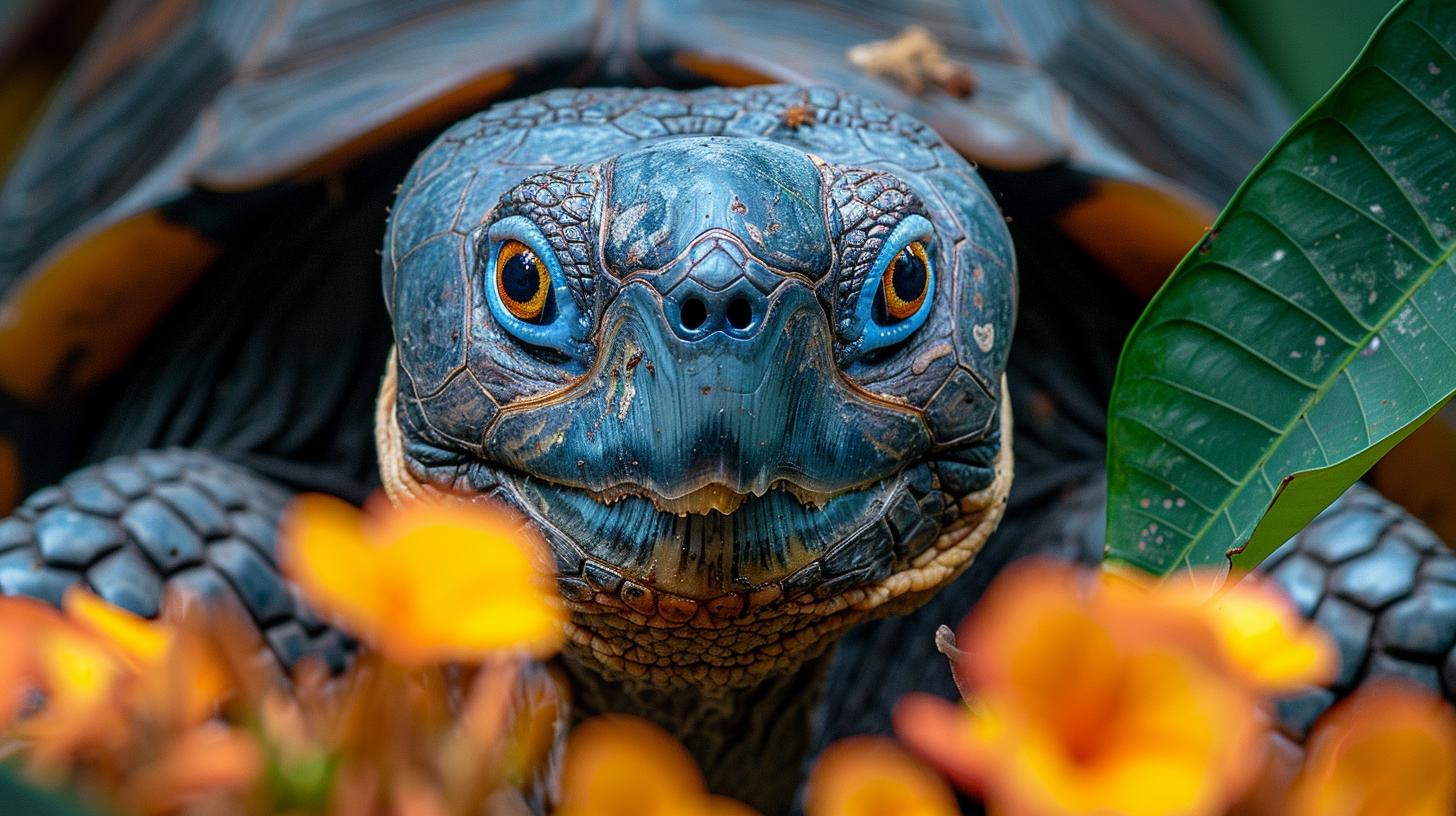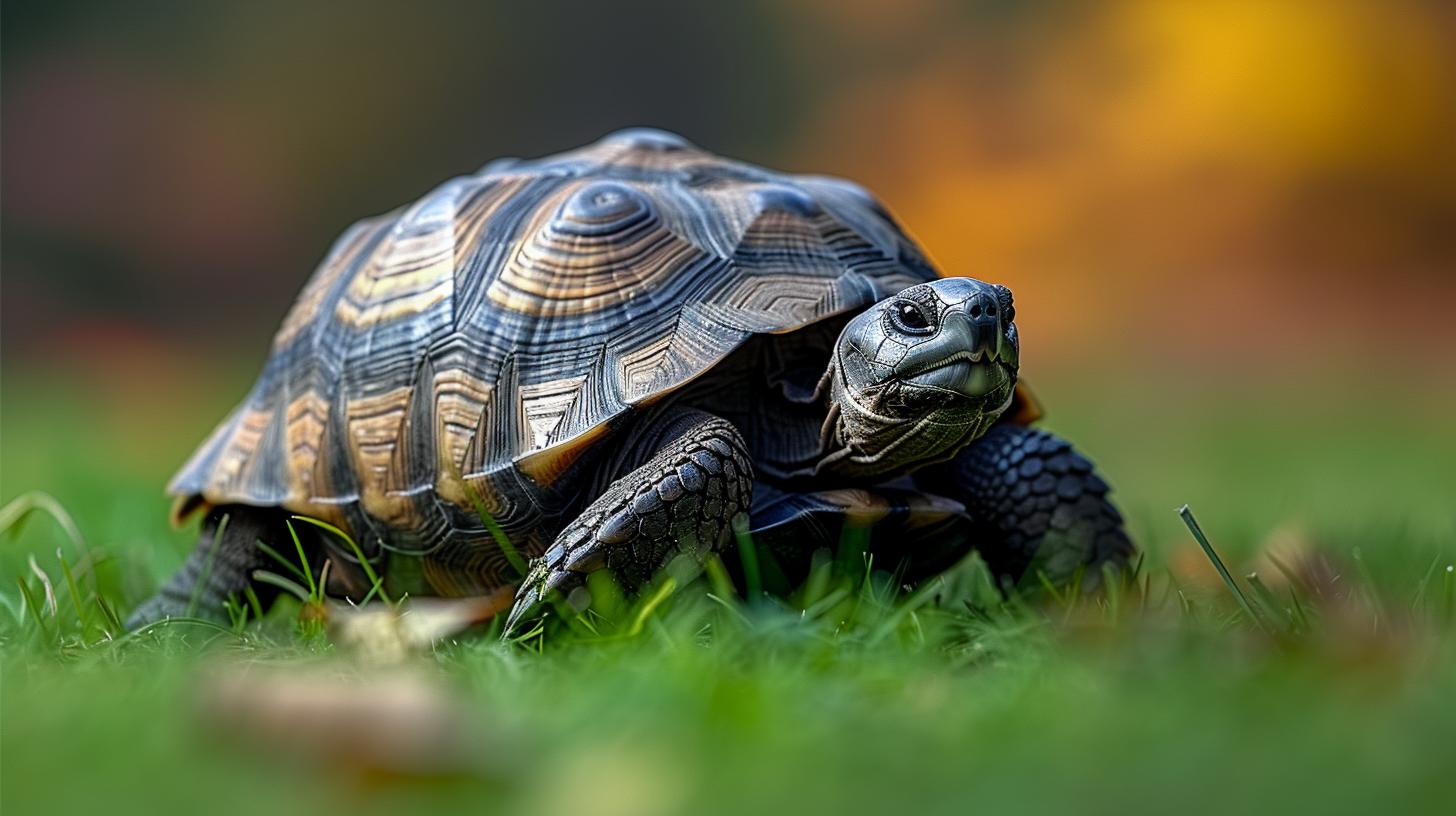Top Vitamin Supplements for Tortoise Health & Care

Understanding Tortoise Nutritional Needs
Taking care of a tortoise goes beyond providing a comfortable habitat; it requires keen attention to their dietary needs, including tortoise vitamin care. Understanding what constitutes a balanced diet is the cornerstone of maintaining their health and vitality.
This is especially true when considering the vital role vitamins play in their overall well-being. By delving into the nutritional requirements of these fascinating reptiles, we uncover not only the importance of a well-rounded meal but also the potential consequences of vitamin deficiencies that can endanger their health.
The need for calcium and vitamin D3 takes center stage when focusing on shell and bone health in tortoises. These nutrients are not just beneficial but essential for maintaining a sturdy shell and robust skeletal structure. Calcium lends strength to their shells, while vitamin D3 facilitates its absorption and plays a crucial role in bone development.
Moreover, the synthesis of vitamin D3 is significantly influenced by exposure to sunlight, demonstrating nature's intricate design for sustaining life. Herein lies an interesting intersection between natural processes and dietary needs that underscores the complexity of tortoise care.
Navigating through the essentials of tortoise vitamin care introduces pet owners to vital supplements such as *Vitamin A*, *B-group vitamins*, and *Vitamin E*. Each plays unique roles, from supporting eye health to aiding in metabolic processes and acting as antioxidants.
Recognizing signs of deficiency is just as crucial as understanding benefits, guiding informed choices regarding supplementation. Moving beyond basic care, this knowledge equips owners with the tools needed for proactive wellness practices that can greatly enhance their beloved tortoises' quality of life and longevity.
The Role of Calcium and Vitamin D3 in Shell Health
In the fascinating journey of tortoise care, understanding the pivotal role of nutrition, specifically through the lens of calcium and vitamin D3, is essential for maintaining their well-being. These nutrients stand at the core of what makes a healthy tortoise lifestyle - from a robust shell to overall skeletal health.
Tortoises, known for their distinctive shells and slow yet steady lifestyle, require a nuanced approach to nutrition that mirrors their unique biological makeup. This segment delves into why calcium and vitamin D3 are not just supplementary elements but foundational components in nurturing a thriving tortoise.
Understanding Calcium's Crucial Role
Calcium is not just a vital mineral for humans; it holds similar significance for tortoises. Aiding in the development of a strong shell and skeletal system, calcium intake must be carefully monitored to prevent health issues like metabolic bone disease, a common yet serious condition in captive tortoises. Ensuring your tortoise's diet is rich in calcium is thus quintessential.
However, it's important to note that merely providing calcium-rich foods isn't enough; its absorption plays an even more critical role in tortoise health. This brings us to the indispensable partnership between calcium and vitamin D3.
The Synergy Between Vitamin D3 and Calcium Absorption
While calcium is the building block for shell and bone health, vitamin D3 acts as the facilitator for its absorption. Without adequate levels of vitamin D3, even a diet high in calcium can fail to prevent nutritional deficiencies.
Sunlight exposure catalyzes the synthesis of Vitamin D3 within a tortoise's body, emphasizing the need for natural sunlight or UVB lighting solutions for those kept indoors. This synergy underscores not only the complexity of tortoise vitamin care but also highlights how interconnected dietary elements are critical to their overall health and longevity.
Furthermore, while these nutrients are crucial, balance is key. Over-supplementation can lead to toxic levels causing as much harm as deficiencies. Thus, understanding proper dosages and how these vital nutrients interact within your pet's diet becomes imperative in fostering optimal shell growth And overall health status.
Essentials of Tortoise Vitamin Care
Understanding and implementing effective *tortoise vitamin care* is pivotal in maintaining your tortoise's vibrant health and longevity. The vitality of several vitamins cannot be understated, extending beyond the commonly discussed calcium and vitamin D3.
Vitamins A, B-group vitamins, and Vitamin E play critical roles in ensuring that a tortoise enjoys a robust immune system, healthy vision, and proper metabolic function. Each of these vitamins supports different aspects of a tortoise's well-being, making them indispensable parts of their diet.
Starting with Vitamin A, which is essential for maintaining good eye health and an effective immune system, deficiencies can lead to serious health issues such as eye disorders and a weakened ability to fight infections. However, an excess can also be harmful, illustrating the need for a balanced intake. The B-group vitamins - particularly B1 (thiamine), B3 (niacin), B6 (pyridoxine), and B12 - support nerve function, energy production, and overall metabolic health.
Signs of deficiency in these areas may manifest as lethargy or neurological issues. Moreover, Vitamin E acts as an antioxidant in the body of the tortoise, protecting it from oxidative stress and supporting skin health.

Incorporating these essential vitamins into your tortoise's diet involves careful consideration and planning. Here are some guiding points:
- Provide a varied diet that includes leafy greens rich in Vitamin A such as kale and turnip greens.
- Ensure access to natural sunlight or UVB light sources to aid in the synthesis of Vitamin D3.
- Consider supplements carefully chosen for their balance of essential nutrients if natural food sources are insufficient.
To weave *tortoise vitamin care* seamlessly into dietary practices:
- Regularly rotate the types of vegetables and fruits provided to avoid nutrient boredom and imbalances.
- Consult with a veterinarian who specializes in reptile care before introducing any new supplement into your tortoise's regimen to ensure it meets their specific needs without causing over-supplementation.
- Keep an eye on behavioral changes or physical signs that might indicate nutritional imbalances or deficiencies.
This section pivots us towards understanding that while all vitamins are crucial for maintaining health, overemphasis on one at the detriment of others could lead to problems down the line. In essence, variety is not just the spice of life; it's fundamental for comprehensive *tortoise vitamin care*.
As we continue exploring this topic in subsequent sections focusing on top vitamin supplements available for tortoises and how you can supplement your tortoise's diet naturally with lifestyle modifications rather than relying solely on commercial products-we keep unraveling layers after layers regarding effective reptile nutrition management strategies today.
Top Vitamin Supplements for Tortoise Health
In the journey to providing optimal care for tortoises, understanding and selecting the right vitamin supplements is a critical step. Tortoise vitamin care goes beyond merely offering them their daily greens; it encompasses a comprehensive approach to ensure they receive a well-rounded diet tailored to their specific needs. This segment delves into some of the best vitamin supplements designed to support tortoise health, each catering to different aspects of their nutritional requirements.
Firstly, it's essential to highlight that calcium and Vitamin D3 supplements stand out due to their vital roles in shell and bone health. A deficiency in these nutrients can lead to soft shells and metabolic bone disease, which are common yet preventable issues in captive tortoises. Therefore, incorporating a supplement that provides an adequate amount of both calcium and Vitamin D3 is crucial.
However, vitamins such as Vitamin A, necessary for skin and eye health, and the B-group vitamins important for metabolic functions should not be overlooked. Additionally, Vitamin E plays a significant role in supporting immune system health, proving beneficial for tortoises exposed to stressful environments or those recovering from illness.
Here is a curated list of top recommended supplements rich in these essential vitamins:
- Calcium with Vitamin D3 Powder: Easily sprinkled over fresh meals, this supplement aids in building strong shells and bones.
- Multivitamin Tortoise Tablets: These provide a balanced blend of all necessary vitamins, including A, E, and the B-complex group clearing up any deficiencies.
- Vitamin E-enriched Supplement: Designed specifically for boosting immune system strength during recovery or stress periods.
While integrating these supplements into your tortoise's diet plan, it's critical not only to follow dosing instructions carefully but also to continue researching and adapting their dietary needs as they grow. Knowing when and how much of each supplement to administer requires paying attention to signs of both deficiency and excess.
Signs such as lethargy or loss of appetite could indicate an imbalance that may need adjustments in nutrition or consultation with a veterinary professional familiar with reptile care.
Continuously monitoring your tortoise's health status while updating their diet regimen ensures they receive all the necessary nutrients without over-supplementation risks. This approach underlines the commitment required in providing comprehensive tortoise vitamin care, ensuring these fascinating animals thrive under our guardianship. The next sections will further expand on natural food sources that can help meet these vitamin needs and discuss how to watch for signs indicating potential health concerns directly linked to nutritional deficiencies.
Supplementing Your Tortoise Diet Naturally
With the commercial availability of various vitamin supplements, it might be tempting to rely solely on these products for your tortoise's nutritional needs. However, incorporating natural foods into your tortoise's diet that are rich in essential vitamins can offer a more holistic approach to their overall well-being.
This strategy not only ensures that your tortoise is receiving vital nutrients in a more natural form but also adds variety to their diet, which mimics their eating habits in the wild. In this section, we delve into how you can supplement your tortoise's diet with nature's bounty, focusing on fruits, vegetables, and other natural food items that are powerhouses of nutrition.

Identifying Nutrient-Rich Foods
To start, understanding which foods are beneficial for your tortoise is key. Leafy greens such as dandelion greens, kale, and arugula are excellent sources of vitamins A and K but should be fed in moderation due to oxalates that can hinder calcium absorption. For a boost of vitamin C, bell peppers and strawberries make great additions to their meal plan.
Notably, offering a variety of colored vegetables like carrots and squash can enhance your tortoise's intake of vitamin A, crucial for vision and immune health. It's important to introduce new foods gradually into their diet to monitor any adverse reactions.
Natural Sources vs. Supplements
While supplements play an essential role in *tortoise vitamin care*, they should ideally complement rather than replace natural food sources. Synthetic supplements might not always be absorbed as effectively as nutrients from whole foods and could lead to imbalances if not administered carefully. Moreover, feeding your tortoise fresh fruits and vegetables can stimulate their appetite and encourage natural foraging behavior, contributing positively to their physical health and mental stimulation.
Incorporating these nutrient-rich foods into your tortoise's diet not only caters to their vitamin needs but also aligns closely with promoting a lifestyle that is as close as possible to what they would experience in their native habitats. By seeking out fresh produce high in essential vitamins and balancing it with the right supplements when necessary, you'll be taking significant strides towards ensuring the longevity and vitality of your cherished pet.
Common Health Problems Linked to Vitamin Deficiency in Tortoises
Tortoises are remarkable creatures, having thrived on Earth for millions of years. Their longevity and resilience, however, do not exempt them from the need for a meticulously balanced diet, specifically designed to meet their unique nutritional requirements.
One aspect of tortoise care that is often underestimated is the vital role that vitamins play in their overall health. A deficiency in certain vitamins can lead to a variety of health problems, some of which can have serious, long-lasting effects on your pet tortoise's well-being.
Vitamin shortages in tortoises can manifest in several ways, each linked to the absence of specific nutrients essential for their development and health. For example, Vitamin A plays a crucial role in maintaining healthy skin, eyesight, and respiratory systems. A lack of this vitamin can result in symptoms such as swollen eyelids or poor growth rates.
Similarly, deficiencies in B-group vitamins can impact nerve function and energy metabolism, leading to lethargy or anorexia. Therefore, understanding these signs and correlating them with dietary gaps is paramount for preventive care.
Furthermore, the intrinsic connection between tortoise vitamin care naturally underscores the need for a diverse diet that includes both naturally occurring sources of these nutrients and supplemental options when necessary.
Addressing deficiencies before they escalate into more severe health issues means recognizing that each vitamin serves an essential purpose-be it bone health facilitated by Vitamin D3 and calcium or antioxidant properties offered by Vitamin E. As we navigate through common health challenges faced by tortoises due to inadequate vitamin intake, it becomes clear that proactive nutritional management is key to avoiding such complications.
Crafting a Balanced Diet Plan
As we wrap up our exploration of ensuring supreme health and care for tortoises through a meticulously crafted diet plan, it becomes palpable that understanding and fulfilling their nutritional needs go beyond mere responsibility. It's an art that intertwines knowledge with passion, aiming to provide these splendid creatures with a life brimming with vibrancy and vitality.
The journey from recognizing the fundamental role of vitamins in a tortoise's diet to selecting top-quality vitamin supplements embodies our commitment to nurturing their well-being. This dedication not only enriches their lives but also fortifies the bond shared between tortoises and their caretakers.
Focusing on the essentials of tortoise vitamin care illuminates the path to preventing common health issues linked to nutritional deficiencies. By integrating natural food sources rich in essential nutrients like Calcium, Vitamin D3, A, B-group vitamins, and Vitamin E into your pet's diet alongside recommended supplements, you create a shield against ailments and foster a foundation for enduring health.
This holistic approach doesn't merely address the symptoms but cultivates an environment where thriving is second nature to your shelled companion.
Embarking on this comprehensive dietary strategy ensures that every meal contributes positively to your pet's shell strength, bone health, and overall vitality. As we've traversed through key insights-from understanding nutritional needs to supplementing diets naturally-it's evident that optimal tortoise care involves continuous learning and adaptation. Thus, we invite you to delve further into our world of pet care enlightenment.
Discover more articles filled with actionable advice and engaging content designed to elevate the quality of life for your beloved pets. Your journey towards becoming an exemplary tortoise caretaker continues here-unravel more secrets behind effective pet care by browsing through our extensive collection today.
Leave a Reply
You must be logged in to post a comment.